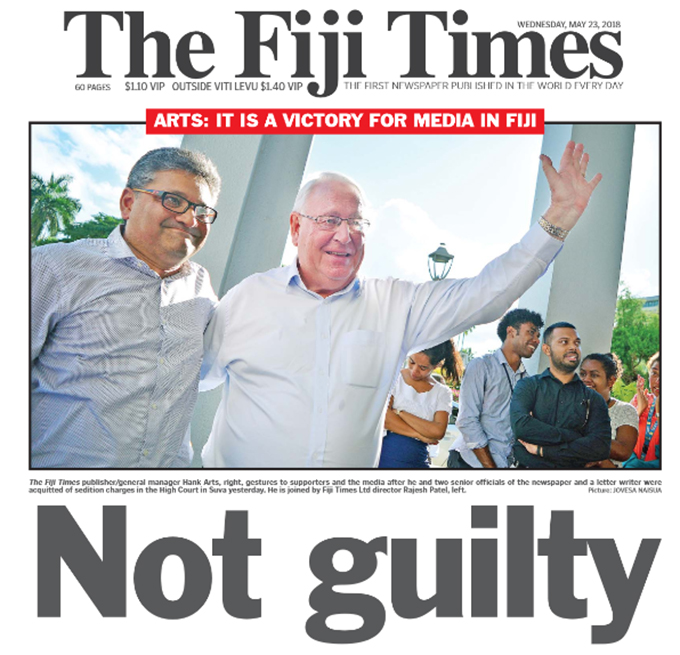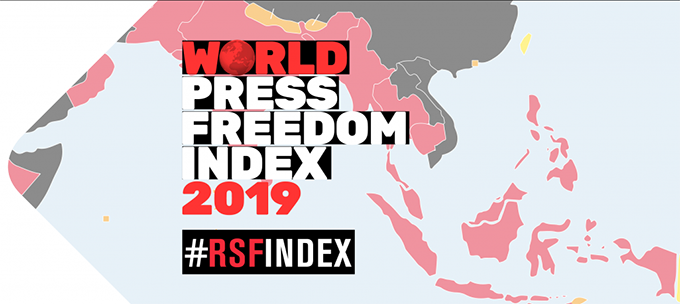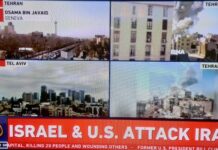
Pacific Media Watch Newsdesk
Fiji, New Zealand and Timor-Leste have made significant gains in the latest annual Reporters Without Borders World Press Freedom Index while the Paris-based global watchdog has warned that totalitarian propaganda, censorship, intimidation and cyber-harassment have been on the rise in the Asia-Pacific region.
“A lot of courage is needed nowadays to work independently as a journalist in the Asia-Pacific countries, where democracies are struggling to resist various forms of disinformation,” the RSF report said.
Fiji gained five places to rise to 52nd in the world due to a “relatively pluralist and balanced” coverage of the 2018 parliamentary elections and the acquittal of three of The Fiji Times journalists and executives and a letter writer on sedition charges last May in what was seen as an “encouraging victory for press freedom”.
READ MORE: The RSF World Press Freedom Index

Timor-Leste jumped 11 places to 84th because of the way the media covered the 2018 elections and showed how news organisations could “play a role in the construction of democracy”.
New Zealand rose one place to seventh among the world’s top 10 countries because the business regulator Commerce Commission had blocked a merger between the country’s two major news groups, Stuff and the NZ Media and Entertainment (NZME), in a victory for media plurality.
Malaysian ‘fresh air’
Two significant rises in the RSF Index – both of 22 places – highlighted the degree to which a country’s political ecosystem impacts on the freedom to inform.
In Malaysia, the ruling coalition was ousted in an election for the first time in the country’s 62 years of independence.
This blew fresh air through the ossified media and transformed the environment for journalists, propelling Malaysia to 123rd place.
In Maldives, the election of a new president who had given firm – and partially kept – promises to improve press freedom enabled this Indian Ocean archipelago to jump to 98th place.
News ‘black holes’ sink further
Conversely, two countries already festering near the bottom of the Index – China and Vietnam – both managed to fall another place, to 177th and 176th respectively, because of the monopoly of power exercised by their presidents, Xi Jinping and Nguyen Phu Trong.
The first amended the constitution in order to be “president for life” in March 2018. The second now heads both the Communist Party and the state.
In each country, the ruling elite suppresses all debate in the state-owned media while cracking down relentlessly on citizen-journalists who try to make a dissenting voice heard.
Around 30 professional and non-professional journalists are detained in Vietnam, and nearly twice as many are detained in China.
China’s anti-democratic model, based on Orwellian high-tech information surveillance and manipulation, is all the more alarming because Beijing is now promoting its adoption internationally.
As well as obstructing the work of foreign correspondents within its borders, China is now trying to establish a “new world media order” under its control, as RSF showed in its latest report on China.
Laos also fell one place to 171st, above all for preventing journalists from covering the dramatic collapse of a dam in July 2018.
These one-party states are inexorably drawing closer to their North Korean “brother”, which managed a miniscule one-place rise to 179th thanks to the semblance of an opening as a result of the summits that brought Supreme Leader Kim Jong-un and President Trump together.
Growing censorship, self-censorship
While the islands of press independence are under attack, the Chinese system of total news control is increasingly serving as a model for other anti-democratic regimes such as Singapore (151st), which has established self-censorship as the norm, Brunei (152nd, -1) and Thailand (136th).
Similarly, censorship has become the norm in Cambodia (143rd), where the government has eliminated all independent media, and Hong Kong (73rd), where the leading traditional media now receive pressure to comply with Beijing’s dictates.
In the absence of editorial independence vis-à-vis the authorities, Papua New Guinea (38th) and Tonga (45th) also saw an increase in self-censorship in 2018.
In Pakistan (142nd, -3), the military establishment’s harassment of the media in the run-up to the general election in July 2018 resulted in an increase in censorship comparable to the worst moments during Pakistan’s military dictatorships.
Deadly field reporting
Reporters are also exposed in the field in Pakistan, where the environment is extremely unsafe. At least three were killed in connection with their work in 2018.
The security situation is even more worrying in Afghanistan (121st, -3), where – despite the government’s efforts – 16 media professionals were killed in connection with their reporting, nine of them in a double bombing that explicitly targeted the press.
Much courage is now needed to be a field reporter in Afghanistan. Although less dramatic, the situation was also worrying in Bangladesh (150th), where reporters covering protests and the election were the targets of unprecedented violence.
Physical violence against journalists is encouraged by the fact that the perpetrators usually enjoy complete impunity, as is still the case, for example, in Sri Lanka (126th). In India (140th, -2), at least six journalists were also killed while trying to work in 2018. This tragic toll was accompanied by an increase in violence coming from all quarters, including the security forces, organized crime and political activists.
Cyber-harassment, disinformation
India’s journalists are being attacked online as well as in the field. All those who dare to criticize Prime Minister Narendra Modi’s Hindu nationalist ideology online are branded as “anti-Indian” scum who must be purged.
This results in appalling cyber-harassment campaigns in which journalists are threatened not only with death but also rape (as the troll armies like harassing women journalists, in particular).
The same phenomenon is found in the Philippines (134th, -1), where attacks against the independent press by President Rodrigo Duterte’s government are accompanied by coordinated cyber-attacks.
The most emblematic case is undoubtedly that of the news website Rappler and its editor, Maria Ressa, who is the target of both recurring online harassment campaigns and a series of prosecutions orchestrated by different government agencies.
The use of social networks is also worrying in Myanmar (138th, -1), where disinformation and anti-Rohingya hate messages spread on Facebook without being moderated, benefitting the government led by Aung San Suu Kyi, who reacted with a deafening silence to the seven-year jail sentences imposed on Reuters journalists Wa Lone and Kyaw Soe Oo in September 2018 for trying to investigate the Rohingya genocide.
Democracies swamped
These waves of disinformation are helping to erode democracy throughout the region, and press freedom with it. Democratic countries are having more and more difficulty in resisting this toxic groundswell, with the result that many are failing to improve their ranking in the RSF Index.
On the grounds of regulating social networks, some countries such as Nepal (106h) and Samoa (22nd) have, for example, adopted repressive laws that hamper investigative journalism.
The absence of structural reforms that foster greater press freedom is also preventing countries such as South Korea (41st) and Indonesia (124th) from progressing. And independent journalism is rendered extremely difficult when the media environment becomes too polarized, as in Taiwan (42nd) and Mongolia (70th).
Pluralism in danger
Finally, it is becoming increasingly difficult for media pluralism to resist the imperatives of media ownership concentration and business interests, as in Japan (67th) and Australia (21st, -2).
New Zealand (7th, +1) is exposed to similar phenomena, but has a regulator that was able to prevent too much media concentration. It therefore rose one place, in a sign that institutional guarantees pay off.











































